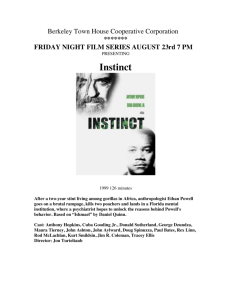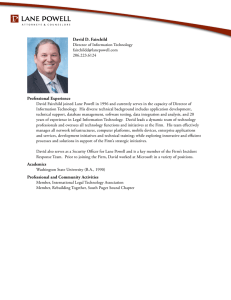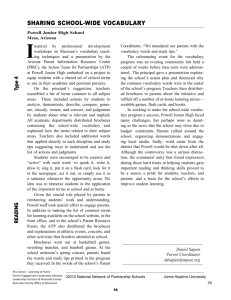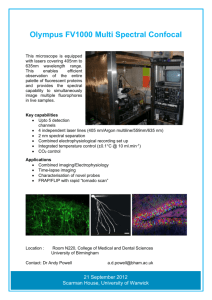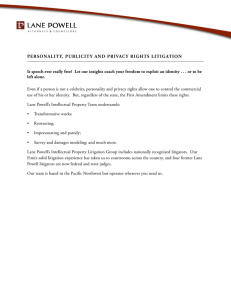Scientific Foundations Committee Meeting September 9, 2011 7:30 – 9:00 am, B-646 Mayo
advertisement
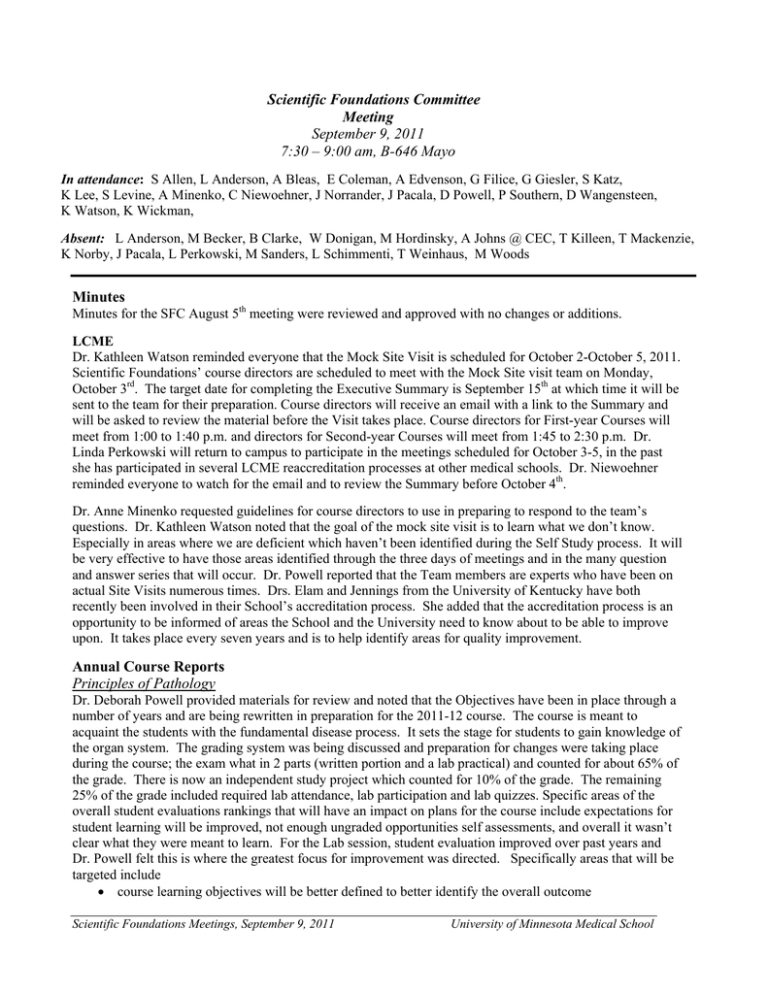
Scientific Foundations Committee Meeting September 9, 2011 7:30 – 9:00 am, B-646 Mayo In attendance: S Allen, L Anderson, A Bleas, E Coleman, A Edvenson, G Filice, G Giesler, S Katz, K Lee, S Levine, A Minenko, C Niewoehner, J Norrander, J Pacala, D Powell, P Southern, D Wangensteen, K Watson, K Wickman, Absent: L Anderson, M Becker, B Clarke, W Donigan, M Hordinsky, A Johns @ CEC, T Killeen, T Mackenzie, K Norby, J Pacala, L Perkowski, M Sanders, L Schimmenti, T Weinhaus, M Woods Minutes Minutes for the SFC August 5th meeting were reviewed and approved with no changes or additions. LCME Dr. Kathleen Watson reminded everyone that the Mock Site Visit is scheduled for October 2-October 5, 2011. Scientific Foundations’ course directors are scheduled to meet with the Mock Site visit team on Monday, October 3rd. The target date for completing the Executive Summary is September 15th at which time it will be sent to the team for their preparation. Course directors will receive an email with a link to the Summary and will be asked to review the material before the Visit takes place. Course directors for First-year Courses will meet from 1:00 to 1:40 p.m. and directors for Second-year Courses will meet from 1:45 to 2:30 p.m. Dr. Linda Perkowski will return to campus to participate in the meetings scheduled for October 3-5, in the past she has participated in several LCME reaccreditation processes at other medical schools. Dr. Niewoehner reminded everyone to watch for the email and to review the Summary before October 4th. Dr. Anne Minenko requested guidelines for course directors to use in preparing to respond to the team’s questions. Dr. Kathleen Watson noted that the goal of the mock site visit is to learn what we don’t know. Especially in areas where we are deficient which haven’t been identified during the Self Study process. It will be very effective to have those areas identified through the three days of meetings and in the many question and answer series that will occur. Dr. Powell reported that the Team members are experts who have been on actual Site Visits numerous times. Drs. Elam and Jennings from the University of Kentucky have both recently been involved in their School’s accreditation process. She added that the accreditation process is an opportunity to be informed of areas the School and the University need to know about to be able to improve upon. It takes place every seven years and is to help identify areas for quality improvement. Annual Course Reports Principles of Pathology Dr. Deborah Powell provided materials for review and noted that the Objectives have been in place through a number of years and are being rewritten in preparation for the 2011-12 course. The course is meant to acquaint the students with the fundamental disease process. It sets the stage for students to gain knowledge of the organ system. The grading system was being discussed and preparation for changes were taking place during the course; the exam what in 2 parts (written portion and a lab practical) and counted for about 65% of the grade. There is now an independent study project which counted for 10% of the grade. The remaining 25% of the grade included required lab attendance, lab participation and lab quizzes. Specific areas of the overall student evaluations rankings that will have an impact on plans for the course include expectations for student learning will be improved, not enough ungraded opportunities self assessments, and overall it wasn’t clear what they were meant to learn. For the Lab session, student evaluation improved over past years and Dr. Powell felt this is where the greatest focus for improvement was directed. Specifically areas that will be targeted include course learning objectives will be better defined to better identify the overall outcome Scientific Foundations Meetings, September 9, 2011 University of Minnesota Medical School continue to improve the labs and develop them as more active learning experiences more thorough and clearer understanding of what is taught in other courses, stronger effort to integrate across courses, disciplines and Duluth/TC campuses The independent study project is designed as small group activities to study neoplasia. Their materials include use of test results (X-ray, MRI), consult with a physician (assigned resource person), determining a diagnosis, completing a 1-page synopsis as a handout and giving a 5 minute presentation of their findings. It is graded as a group with each person in the group receiving the same grade. As an aspect of this assignment being designed as a group project, each group did a peer review of each member of their group. Dr. Powell thinks the performance on this project for all groups was very strong Feedback from students uniformly indicated the groups were too large, based upon this information next year’s small groups will consist of just four students. Additional changes for next year include the following: faculty retreat –new faculty involved in the course will meet to collaborate faculty want to add more small group sessions to supplement the labs Basic science research faculty have formed a small advisory group to enhance content for the basic science of the principles of pathology faculty will perform a comprehensive review the lab materials and update them the course content will be reviewed with an eye to improving the flow of material which may reduce the number of lectures at this time the technology support position is vacant and staff responsibilities for the course are being reviewed Course directors discussed the logistics of adding a required presentation component, i.e. set aside a block of time or as a portion of their exam time. Discussion continued regarding how to add active learning across the curriculum. Questions were raised regarding structure, formats, time commitment, and what outcome is being sought. Dr. Powell expressed the need to develop methods to put fundamental science knowledge into a clinical context. Dr. Blaes shared that in the clinical setting, students want to know what to memorize while faculty work to guide them by working to instill the self initiative to learn. Dr. Minenko pointed to the need to make students aware of the concept of “clinical reasoning” by making it part of their understanding/ vocabulary, i.e. course objectives and evaluations, etc. Faculty try to lead them to understand there isn’t just 1 right answer. It’s a matter of what is the best answer for the individual patient, which they must learn is their job. Dr. Powell reported for the Pathology course the exam format will not be multiple choice, possibly short essay questions/answers. Dr. Powell spoke about the role of the basic science faculty advisory group; will help advise the faculty who teach the Principles of Pathology on the science aspect of pathology. Those faculty who are clinicians will use that input to keep the science content but with a clinical focus. The advisory group involves parts of their department that haven’t been involved in medical student teaching. Human Sexuality Course Dr. Eli Coleman provided an overview of the course, which is taught during the summer months. The faculty involved in the course improved articulation of the learning objectives. Their goal is to refine them more for the course in 2011-12. There are three components of the learning objectives; attitudes, knowledge and skills. The attitudinal and values component designed to help students look at their own attitudes and values to recognize what they are and to separate them from a professional perspective. The students are sensitized to how their values interact with complex clinical problems; another aspect is understanding the boundaries of the doctor/patient relationship, especially when it comes to sexual boundaries and touch. Students’ previous experience in medical school with patient interviews doesn’t necessarily prepare them for asking questions regarding patients’ sexual practices and health. The small group tutorials are designed to help students learn Scientific Foundations Meetings, September 9, 2011 University of Minnesota Medical School and become comfortable in using these skills to learn important details to help patients manage these complex cases. There are 4 group tutorial sessions with 14 students in each group, which are co-led by a physician and a behavioral medicine faculty, to develop the bio-psycho-social aspects of complex medical cases involving sexuality. Lectures provide basic knowledge including epidemiology, pathophsiology and medical management. This P/F course, grading is based upon the patient management case. The papers are very strong, method for assessing the application of knowledge, but other than informal feedback it is the only measure that is used. The goal is to add mechanisms to assess more of the knowledge base 2011-12 academic year. Dr. Coleman reviewed areas of success for AY2010-11, noting that the course schedule was reduced by 1/3 its length They realized a reduction to teaching time through a cut in the SARs from 2 full days to 1 day. Students responded positively to less time in lecture, but there was a reduction in exposure to an array of behaviors and sensitizing them to being compassionate, patient-center physicians requires lengthier exposure to use of sexually explicit materials. The patient panels are one of the most positive aspects of the course for students and exposes them to a great deal of diversity and is very effective in sensitizing students to new knowledge and interaction with patients. Dr. Coleman asked for suggestions for different methods of assessment, responses included the following suggestions: consider a pre and post attitude test ask students what barriers exist when role playing message from Med Ed regarding the importance of treatment for diverse populations coordinate with ECM in specific timing of physical exam and related human sexuality topics Add to Microbiology ex;licit symptoms of STDs Determine over arching goal Discussion Integration Dr. Steven Katz provided a brief synopsis of the charge to the Integration Ad Hoc committee; the group’s set of working guidelines include: What do we want doctors to know how to do Culture across courses Active learning Critical reasoning and critical thinking Content – complexity and breadth (use curriculum database, mapping *mapped down to sessions by November 1, 2011 Suggestions to ESC to work toward integration across course, disciplines and between campuses: Take time & effort to design a curriculum Goals and how to meet them Make the decision to look at comprehensive design of curriculum See other programs What does success mean How to generate and coordinate collaboration between campuses Additional information will be provided by ESC when it becomes available. Next Meeting: SFC October 4, 2011 Scientific Foundations Meetings, September 9, 2011 University of Minnesota Medical School
